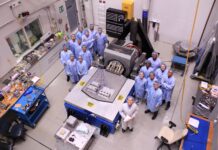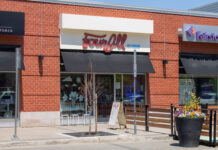Colleen McMillan disagrees with the notion that elderly people are not keen on using technology.
“There is actually a myth that older adults do not like the use of technology and we found that to be incorrect. They like the accessibility of carrying the wellnes app with them and they could use the app and the exercise anywhere anytime,” She said.
As an associate professor at the School of Social Work at the Renison University College, McMillan presented her research in a poster fair as part of the second annual William F. Forbes Lecture.
The lecture was hosted by the Network for Aging Research on Jun. 18 in the UW Optometry building.
More than a hundred people attended the event, including both academic and industry members associated with aging and technology.
The event included academic poster presentations, industry booths, and a guest lecture on technology and aging from Alex Mihailidis, the Barbara G. Stymiest Chair in Rehabilitation Technology at the University of Toronto and the Toronto Rehabilitation Institute and the scientific director of the AGE-WELL Network of Centres of Excellence.
Mihailidis recognized the positive impact of technology to help with aging populations but also pointed out some important gaps between technology and aging.
“The literature and research have shown that technology can have very significant potential and opportunities to support healthy and active aging…. The needs of the older adults are very complex. More often than not, an understanding of these users’ needs is not part of a project. And finally, there is still this ‘silo’ mentality within the field that has resulted in poor outcomes,” He said.
The assumption that elderly people dislike technology is a fixed mindset within the aging field. This indicates there are more gaps to be addressed within the field.
Of the eight industry members also attended the event, one was Stabilo Medical, a start-up from UW, which focuses on creating a wearable product to help stroke patients towards better rehabilitation.
For more information visit uwaterloo.ca/network-for-aging-research/dr-william-f-forbes-lecture-keynote-speaker-dr-alex.
































